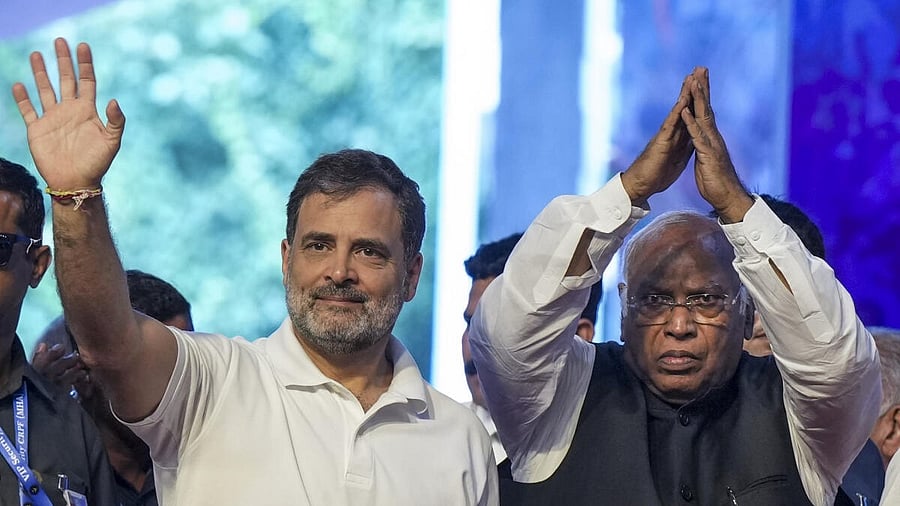
Congress President Mallikarjun Kharge and LoP in Lok Sabha Rahul Gandhi during the party's 'Vote Adhikar Rally', at Freedom Park in Bengaluru, Friday, Aug. 8, 2025.
Credit: PTI Photo
Leader of the Opposition Rahul Gandhi’s charges of large-scale electoral fraud and “vote theft” in Bengaluru (Central) during the 2024 parliamentary elections demand urgent scrutiny. Congress alleges over one lakh fake votes in Mahadevapura alone: 11,000 duplicate registrations, 40,000 voters with dubious addresses, 10,000 bulk voters in single dwellings, 4,000 invalid photographs, and 33,000 cases of Form-6 misuse, including nonagenarians registered as first-time voters. Such numbers, if accurate, point to a deeply compromised electoral process. Yet, before blaming others, the party must look inward. When the final draft voters’ list was shared with all parties well before polling, why did Congress fail to flag these anomalies? Why did booth-level workers not notice these discrepancies during door-to-door campaigning? On polling day, agents could have formally protested suspected bogus voting, ensuring such ballots were quarantined. Post-results, Congress should have filed an election petition if malpractice was suspected. But it did none of these. Is this belated outrage negligence?
That said, the postmortem still matters. If Rahul’s documents are authentic, it indicates a significant compromise in the sanctity of the electoral rolls. Duplicate entries often occur when people fail to get their old registrations deleted after shifting residences, but this could have been weeded out using modern database tools. On this front, the Election Commission’s (EC) lapse is undeniable. The bigger question is whether these alleged fake voters actually cast their ballots, thereby influencing the election outcome, or if their names merely appeared on the rolls? Rahul’s evidence suggests at least one person with an identical name and address voted twice.
The EC has demanded he submit his charges on oath, with a veiled threat that he could face legal action if they are found to be false. However, the EC should have adopted a more proactive approach. By now, it should have independently verified Rahul’s claims rather than allowing the political theatre to dictate the pace of action. When the finger of suspicion points at the very body meant to ensure free and fair elections, it cannot be allowed to sit in judgement over itself. The Congress must demand an independent Special Investigation Team (SIT), monitored by the High Court, to conduct a forensic audit of the rolls and election process. If Rahul’s claims are baseless, let him face prosecution. But if substantiated, consequences must follow from ground-level officers to those who cleared these “tainted” rolls. This is more than a contest between two political parties. If elections have been manipulated and the will of the people stolen, it is an affront to the Constitution and an assault on democracy itself.
